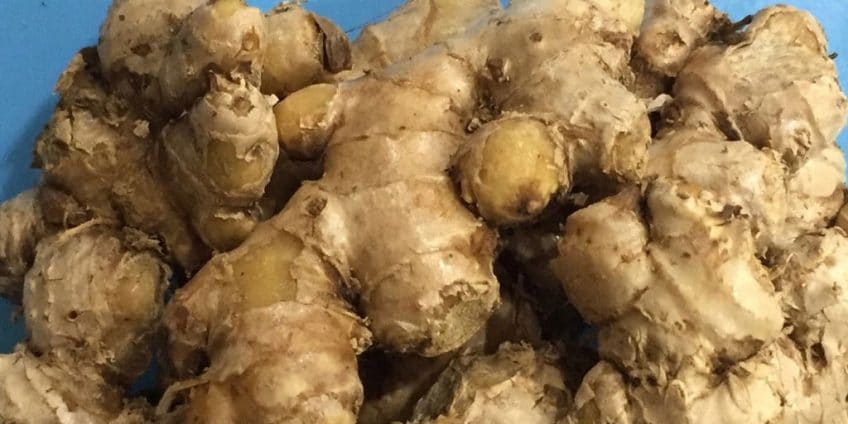Scroll to Recipes with Ginger / अदरक as ingredient
Ginger is used as a spice in cooking all over the world. It is the rhizome of the perennial plant Zingiber officinale in the family Zingiberaceae.
In 2016, the global production of ginger was 3.3 million tonnes, with India producing 34% of the world total. Nigeria, China, and Indonesia also had substantial production.
It is used in various forms. From teas to dried powders (saunth), ginger has been a healing elixir to treat innumerable ailments.
Commonly known as
Ginger, in India, is commonly known as Adarak. Other names are below:
| Language | Name | Written as |
|---|---|---|
| Bengali | Ādā | আদা |
| Gujarati | Ādu | આદુ |
| Hindi | adarak | अदरक |
| Kannada | Śuṇṭhi | ಶುಂಠಿ |
| Malayalam | iñci | ഇഞ്ചി |
| Marathi | Ālē | आले |
| Tamil | Iñci | இஞ்சி |
| Telugu | Allaṁ | అల్లం |
| Urdu | adarak | ادرک |
| Sanskrit | aadrakan, aavyath | अव्यथ, आद्रकं |
| Arabic | zanjibayl | زنجبيل |
Nutritional Profile of Ginger
Nutritional profile per 100 gms
- Calories: 80
- Protein: 1.8g
- Carbohydrate: 18g
- Fiber: 2g
- Fat: 800mg
- Sodium: 13mg
- Potassium: 415mg
Source: USDA & Google
Minerals and Vitamins
Potassium
Ginger contains potassium that works as an electrolyte in the body. Electrolytes are essential for the transmission in the nervous system, and it also regulates the fluids in our body.
Vitamin B
Vitamin B1 utilizes protein and carbohydrates for creating energy in our bodies. Whereas, Vitamin B3 uses fats also along with protein and carbohydrates to help to make energy. Ginger contains the right amount of both of these vitamins in it.
Manganese
It is an essential mineral responsible for the formation and health of our bones. Besides, it is also required for the proper functioning of the brain and nervous system.
Iron
Iron is useful for the production of red blood cells in our body. Those who have a deficiency of iron in their body suffers from anemia. Studies suggest that ginger can help with treating this disease.
Source: ncbi.nlm.nih.gov
Health Benefits of Ginger
Ginger contains Gingerol
Gingerol is the active compound in ginger that houses most of its medicinal properties. It contains powerful anti-oxidant and anti-inflammatory effects. It is considered a potential medicine for the prevention of many diseases.
Source: ncbi.nlm.nih.gov
Can treat many forms of Nausea
Studies suggest that ginger might help with Nausea. According to the reviews, it is favorable to use ginger for morning sickness-especially for pregnant ladies, seasickness, and sickness induced in cancer patients after chemotherapy.
Source: ncbi.nlm.nih.gov
May Reduce Muscle Pain and Soreness
Ginger contains gingerol as the main compound that possesses anti-inflammatory properties. Although ginger does not become useful directly, it can help with day to day progression of muscle pain.
Source: PubmedCentral
Prevent Germs
Certain chemicals present in ginger helps prevention of the growth of bacteria in our body. It also prevents bacteria like E.coli to grow inside.
Source: ncbi.nlm.nih.gov
Anti-Inflammatory
Research has concluded that ginger helps to fight inflammation caused by osteoarthritis. Because of the phytochemical properties, ginger provides anti-inflammatory benefits.
Source: www.ncbi.nlm.nih.gov
Lowering Cancer Risk
Ginger is an excellent anti-oxidant. The anti-oxidant properties present in ginger helps to get rid of oxidative stress. This kind of stress is when there are too many free radicals in our bodies. Ginger releases the radicals from our system and helps fight cancer.
Source: www.ncbi.nlm.nih.gov
Side Effects
Ginger is safe for consumption for most of the people generally. It does not have any side effects when taken in a small proportion.
However, if you consume it more than the recommended amount, you might experience a rash on your skin.
Besides this, you may also observe gas, heartburn, upset stomach, and mouth irritation too.
Source: drugs.com
Frequently Asked Questions
What effects ginger has on our body?
Ginger is commonly used to treat cold, helping with digestion, and reduce Nausea. It also helps with inflammation and acts as an anti-oxidant.
Source: ncbi.nlm.nih.gov
How much dosage of ginger is safe?
Up to 3-4 grams of raw ginger can be consumed in a day. But a pregnant lady is advised not to consume more than 1 gram of ginger per day. It can vary depending on the purpose of consumption.
Source: webmd.com
How do I use ginger?
Ginger can be used both in cooking and as medicine. It goes great with almost all Asian dishes. Besides, people use it to treat nausea, cold, and digestive problems.
What are the side effects of ginger?
Side effects of ginger might include skin rashes, mouth irritation, upset stomach, heartburn, and diarrhea.
Sources: drugs.com
Is ginger helpful with ulcers?
A study supports this, stating that ginger can help with gastric ulcers.
Source: www.ncbi.nlm.nih.gov
Is ginger helpful with Arthritis?
Yes, the consumption of ginger has been found helpful with arthritis symptoms.
Source: www.ncbi.nlm.nih.gov
[/faq]

